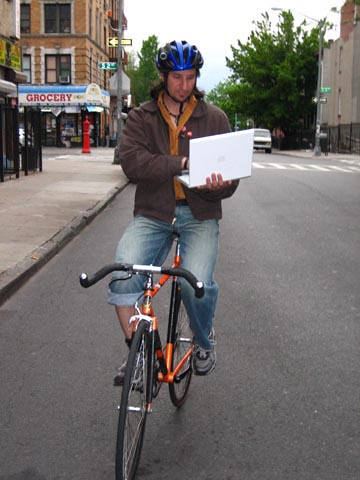Couriers got it bad in Iraq...maybe they should get bicycles.
From the NY Times:
February 22, 2006
Neither War Nor Bombs Stay These Iraq Couriers
By SABRINA TAVERNISE
BAGHDAD, Iraq, Feb. 21 — In a country where the power is usually out, the
police may rob you and few traffic lights actually work, it is perhaps
surprising that Iraqis still get mail.
The territory is demonstrably hostile: the train that carries the letters
north is frequently attacked. Bright orange American vans had to be painted
black for safe passage through dangerous areas south of Baghdad. Postmen on
mopeds brave gun battles to deliver letters in Dora, a Baghdad neighborhood
so paralyzed by violence that corpses lie in the street for hours. And there
are no mailboxes, so postmen deliver to the addressee, not to the address —
a task that has become far more complicated in the upheaval of the past
three years.
But still, six days a week, mail carriers at 349 post offices across Iraq
hand-deliver thousands of letters, to greetings so warm that they often
include dances and high-pitched warbles of sheer joy.
"It's something wonderful to get a letter," said Ibrahim Ismail Zaiden, a
postman in Dora. "The paper, the stamp, the envelope. It is not just a piece
of paper. It is something sacred."
The 181,507 letters delivered last month amount to a slice of normal life in
a place where the bizarre regularly scrambles daily routines. On a sunny
morning last month in Baghdad's central post office, sorters sifted through
small piles of mail on long tables. Deliverymen dragged brightly colored
mail sacks to vans parked outside. Iraqis lined up with their packages and
letters.
The Saddam Hussein stamps are a thing of the past. Now, sheets of new stamps
depict, colorfully if unimaginatively, various means of Iraqi
transportation, including a raft, a horse and carriage, and a canoe piled
high with grasses.
In the Karrada post office — one small room with a cement floor, a giant
poster of a Shiite saint and a few desks and chairs — Abdel Hadi Mahsin Hadi
sorted through the incoming mail: a few bank statements, a letter from
Cyprus in a nondescript envelope.
After the American invasion, postmen received motorbikes to make deliveries,
a coveted perk. Now, every day but Friday, they load up with letters —
packages must be picked up at the post office — and fan out through the
city, steering through the streets and dodging potholes and explosions.
"I talk to him sometimes," Mr. Hadi said of his motorbike.
The mail also offers evidence of recovery. In 2001, before the American
invasion, Iraqis sent 148 tons of mail. (Their relatives in other countries
were better letter writers, sending Iraqis 231 tons that year.) In 2003, the
year of the invasion, the figure plummeted to 37 tons. But it has been
rising ever since, with Iraqis sending 43 tons in 2004 and 54 tons last
year, according to post office statistics.
But this is Iraq, and of course there are problems. During the 2003
invasion, some branch offices were destroyed. Immediately after the
invasion, when looters swept the country, many branches were picked clean.
Mail trucks, bookshelves, even windows were stolen.
Postal officials consolidated locations to keep functioning. In the Baab
Maathem district, for example, a branch limps along in two hospital rooms.
In Adhamiya, in northern Baghdad, another operates out of a Ministry of
Interior office.
"It's a strange place for the post," said Ibrahim Hussein Ali, the
postmaster general and a 40-year veteran of the postal service. "But we must
accomplish our duty."
One of the most common post-invasion problems is finding the addressees.
Baghdad has experienced an enormous population shift: Wealthier families
have moved out and poorer Iraqis from the countryside have flocked to the
capital.
In Karrada, Khaleel Ibrahim said he had spent days trying to find one
recipient. He asks neighbors, ducks into nearby shops. Because of power
failures, doorbells rarely work, and he carries a small metal rod to rap on
doors. The sound sometimes frightens recipients.
"My duty demands that I am patient," said Mr. Ibrahim, his thin frame
hunched on a chair.
The roads are treacherous. Kathem Saed Alwan, a tall Shiite from southern
Iraq and the director of Baghdad's central post office, said he personally
drove mail down a dangerous road south to Babel. A portion of the large
battalion of shiny bright yellow American vans have been painted black for
safer passage.
"Any color but this yellow," Mr. Alwan said, shrugging and smiling.
Highway jihadists once stopped an Iraqi mail truck coming from Jordan,
assuming it was bound for the Defense Ministry, a favored target.
"The driver was begging, saying it was just letters for the people," Mr.
Alwan said.
In Dora, deliveries are a daily battle. Abbas Mikayel, a mail carrier in the
neighborhood, said he had seen four bodies on the streets, and has had to
dodge clashes between the police and insurgents. A group of gunmen once
attacked a colleague, who spent six weeks in the hospital with a broken
shoulder.
"I'm the jihad driver!" he said, grinning widely at stealing the reference
to holy war from insurgents.
The closest call came when he was stuck in traffic and a group of gunmen
walked up to the car in front of him to drag out the driver, kicking and
screaming. He watched silently, hoping the gunmen would not take him, too.
"I cried when I got back to the office," Mr. Mikayel said, pushing his
large-lensed glasses farther up along his nose.
But humor, however black, seems to have remained intact among the postmen.
"If the terrorists heard he made an interview with the foreign press, they'd
behead him!" Mr. Alwan said of Mr. Mikayel. Both men laughed.
The post office for years was heavily Baathist, and many of its top managers
have been replaced since the invasion. Bitterness among midlevel workers
sometimes seems palpable, along with resentment that they have not been
promoted. Still, Mr. Alwan, who began in Baghdad in 2003, said he had never
had a problem as a Shiite newcomer among former Baathists.
As increasing numbers of Iraqis turn to the Internet to communicate with
loved ones, it may be that mail volumes may be damped even as the economy
improves.
But for now, chaos prevails and Iraqis still use the mail.
Sahar Nageeb contributed reporting for this article.











0 Comments:
Post a Comment
<< Home